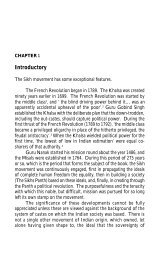Fundamentalism and the Sikh Religious Tradition by T.N. Madan
Fundamentalism and the Sikh Religious Tradition by T.N. Madan
Fundamentalism and the Sikh Religious Tradition by T.N. Madan
You also want an ePaper? Increase the reach of your titles
YUMPU automatically turns print PDFs into web optimized ePapers that Google loves.
<strong>Madan</strong>'s ignorance about <strong>the</strong> <strong>Sikh</strong> ideology <strong>and</strong> Guru Granth is evident, it is not<br />
understood why instead of attributing <strong>Fundamentalism</strong> to <strong>the</strong> Tenth Master he does not<br />
mention its roots in <strong>the</strong> Torah, <strong>the</strong> Bible <strong>and</strong> <strong>the</strong> Qoran, because both Judaism <strong>and</strong> Islam<br />
sanction <strong>the</strong> use of force for political objectives.<br />
So far as <strong>Sikh</strong>s are concerned, it is because of <strong>the</strong>ir religious ideology that <strong>the</strong>y<br />
not only suffered extreme persecution in <strong>the</strong> eighteenth century, but also achieved some<br />
unparalled objectives, first, of stopping, once for all, a thous<strong>and</strong> year wave of invasion<br />
that <strong>the</strong> Indian socio-politcal life had been unable to challenge, much less repel. Of this,<br />
Gupta, <strong>the</strong> doyen of Punjab history writes; "We now close <strong>the</strong> narrative of <strong>the</strong> <strong>Sikh</strong>s, who<br />
placed <strong>the</strong>mselves at <strong>the</strong> head of <strong>the</strong> nation; who showed <strong>the</strong>mselves as <strong>the</strong> interpreters of<br />
<strong>the</strong> rights of <strong>the</strong> people; who maintained <strong>the</strong> struggle between .good <strong>and</strong> evil, between<br />
sovereign will of <strong>the</strong> people <strong>and</strong> <strong>the</strong> divine right of kings, <strong>and</strong> <strong>the</strong> opposition of liberty to<br />
despotism; who avenged <strong>the</strong> insults, <strong>the</strong> outrages <strong>and</strong> <strong>the</strong> slavery of many generations<br />
past; who delivered <strong>the</strong>ir mo<strong>the</strong>r country from <strong>the</strong> yoke of <strong>the</strong> foreign oppressor; who<br />
displayed all that was great <strong>and</strong> noble; who left to <strong>the</strong> children of this province a heritage<br />
unsullied <strong>by</strong> <strong>the</strong> presence of any foreign solider; who won for <strong>the</strong> Punjab <strong>the</strong> envied title<br />
of '<strong>the</strong> l<strong>and</strong> of soldiers'; who alone can boast of having erected a 'bulwark of defence<br />
against foreign aggression', <strong>the</strong> tide of which had run its prosperous course for <strong>the</strong><br />
preceding eight hundred years; <strong>and</strong> to whom all o<strong>the</strong>r people of Nor<strong>the</strong>rn India in<br />
general, <strong>and</strong> of <strong>the</strong> Punjab in particular, owe a deep debt of gratitude."<br />
The second achievement of <strong>the</strong> <strong>Sikh</strong> <strong>Religious</strong> Revolution, has been <strong>the</strong> raising<br />
of <strong>the</strong> level of <strong>the</strong> lowest classes <strong>and</strong> enabling <strong>the</strong>m to st<strong>and</strong> level with <strong>the</strong> highest classes<br />
in all fields of life." It is <strong>the</strong> dichotomy in o<strong>the</strong>r Indian religions, that has enabled <strong>the</strong><br />
inequitous system of caste <strong>and</strong> pollution to survive in Indian society for thous<strong>and</strong>s of<br />
years without any serious socio-political or organised protest. The sanction is so strong,<br />
that even in modern India, <strong>the</strong> statue of a Brahmin Chief Minister, unveiled <strong>by</strong> <strong>the</strong><br />
Deputy Prime Minister of India, Shri Jagjiwan Ram from a Scheduled caste, had to be<br />
purified with holy water from <strong>the</strong> Ganges, because it was considered to have been defiled<br />
<strong>by</strong> <strong>the</strong> touch of one belonging to a Scheduled caste. For like ideological reasons Indira<br />
G<strong>and</strong>hi was not allowed entry in a sacred temple in <strong>the</strong> South.<br />
<strong>Madan</strong> has attributed fundamentalism to Guru Gobind Singh <strong>and</strong> also to B<strong>and</strong>a<br />
Bahadur. But, is it not remarkable that, while <strong>the</strong>ologian Niebuhr has, after <strong>the</strong> Christian<br />
experience of two millenia, suggested only now <strong>the</strong> giving of political power to <strong>the</strong><br />
down-trodden classes, B<strong>and</strong>a Bahadur accomplished it two hundred years earlier, <strong>by</strong><br />
elevating <strong>the</strong> lowest strata of Indian Society, so that <strong>the</strong>y could st<strong>and</strong> up with dignity <strong>and</strong><br />
strength against <strong>the</strong> upper castes <strong>and</strong> <strong>the</strong> elite ? For <strong>the</strong> first time in history, as Qazi Nur<br />
Mohammad wrote, Kalals, Mazhbis, Ramdasias, Ramgarhias <strong>and</strong> Jats became feared<br />
soliders <strong>and</strong> leaders whom <strong>the</strong> ruling elites, both Muslims <strong>and</strong> Hindus, faced with respect.<br />
It is <strong>the</strong> same whole-life system that made significant achievements in <strong>the</strong> time of Ranjit<br />
Singh, who not only once for all stopped <strong>the</strong> wave of invasions <strong>and</strong> tyranny in <strong>the</strong> North<br />
of India, but also gave peace <strong>and</strong> equality of treatment to all communities. It is significant<br />
that it was because of <strong>the</strong> <strong>Sikh</strong> ethos, that despite <strong>the</strong> persecution of <strong>Sikh</strong>s at <strong>the</strong> h<strong>and</strong>s of<br />
<strong>the</strong> earlier Moghal Empire, <strong>the</strong>w was never any expression of bitterness against <strong>the</strong><br />
Muslims or any attempt to convert persons of o<strong>the</strong>r communities to <strong>Sikh</strong>ism. Although it<br />
was a part of <strong>the</strong> <strong>Sikh</strong> tradition, his armies had soldiers from all religions <strong>and</strong> castes,
















